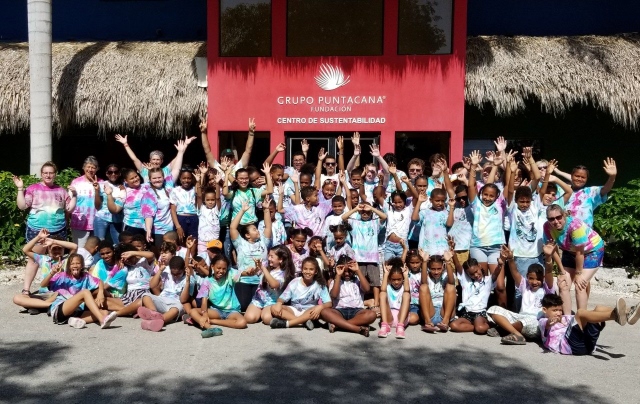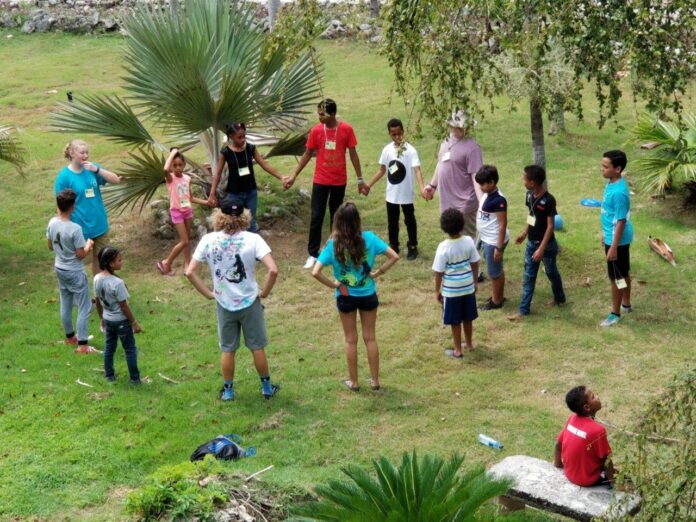Last summer, Ryley Crabtree faced an unusual first-time challenge as a 4-H camp counselor: The campers didn’t speak his language.
“We broke that barrier by playing games – football, jump rope, tag,” he said. “Although we didn’t speak the same language, we all bonded through enjoying activities together.”
By the end of the week, Crabtree had built new leadership and communication skills, made new friends, and enjoyed his first trip outside of the U.S. It was all part of a Virginia 4-H summer program that brings teens to the Dominican Republic for a week of service, sustainability, and cultural exchange.
The program, now in its 16th year, has taken more than 150 Virginia teens and 24 adult volunteers to the fast-developing Caribbean country. Led by Virginia Cooperative Extension Agents Carol Nansel and Christine Hodges, the Dominican Republic trip is the only grassroots Virginia 4-H summer program that takes teens abroad. Participants spend most of their time in the island’s rural and impoverished areas, where they manage a 4-H day camp for Dominican children, perform service projects in villages, and learn to navigate as global citizens.
“For many of our students, they’ve barely been outside of their counties, let alone ventured outside of the country,” said Nansel, a Virginia Cooperative Extension youth development agent from Shenandoah County who co-founded the program in 2006. “I’ve noticed they learn a lot about themselves and appreciate what they have at home. It’s an eye-opener that makes them think about what they cherish about their lives.”
For Crabtree, a Lee County high schooler who is the Virginia 4-H State Cabinet vice president, the trip was “the experience of a lifetime” and his first time outside the U.S.
“When I came back, I was feeling very fortunate and grateful,” he said. “A lot of the kids I met lived in impoverished areas and didn’t have much, but those were some of the happiest kids I’ve ever seen. Those kids want to go to school and look forward to it. I realized I should be happy to go to school. In America, I realized how blessed I really am.”
Last summer, Crabtree joined 21 teens from Virginia and seven Dominican teens to lead 50 children in crafts, games, and educational activities. Their service projects throughout the week included picking up trash and donating books, school supplies, and sports equipment to an underserved school.
The students also had the opportunity to snorkel, dine at the homes of their new Dominican friends, explore local markets, and sightsee in Higüey, the regional capital.
“I made two really good friends that live there,” Crabtree said. “They are honorary Virginia 4-H’ers now. No other state 4-H does anything like this.”
Over the years, Virginia 4-H’ers have held camps for more than 650 Dominican children and involved 150 Dominican teens as local helpers and guides.

The group partners with the Grupo Puntacana Ecological Foundation, a nonprofit organization that supports the country through initiatives focused on education, health, and conservation and is a Virginia Tech research partner. During the program, 4-H’ers bring campers to the foundation’s Center for Sustainability and Center for Marine Innovation, where they learn about the foundation’s efforts to protect endangered coral reefs, native falcons and iguanas; produce organic crops and honey; and to compost and recycle.
Nansel and Hodges are expanding the program into two cohorts this summer, which will allow them to keep groups smaller and to offer the experience to more teens from different parts of the commonwealth.
The 4-H teens are expected to cover most of the $2,500 cost of the trip by raising money in their communities. Shenandoah County 4-H’ers have held car washes, steak dinners, and bake sales to fund their trip expenses. Many community members have stepped in to sponsor Dominican children’s camp fees and donate school supplies.
However, in some areas, teenagers need additional support to be able to attend.
“It’s a challenge in smaller communities like mine – and as we welcome new 4-H participants across the state – to do the fund-raising,” said Hodges, the unit coordinator and youth development Extension agent in Alleghany County. “The price continues to rise, and we don’t want to price ourselves out of providing this opportunity to all kids.”
Katherine Flynn, a 4-H alumna who participated in the trip for three summers as a Shenandoah County high schooler, said the experiences helped propel her toward a career as a U.S. Navy intelligence officer in Bahrain.
“Traveling to the Dominican Republic showed me that there are people in the world who live a lot differently than how I grew up,” she said. “My trips there made me want to travel even more, which led me into a profession where that’s possible. Most trips abroad you get to see the tourist sights, which are beautiful, but this trip really allows you to experience the life of the island.”
More information on the Dominican Republic program can be found here and by contacting Nansel at [email protected] or Hodges at [email protected].
Virginia 4-H is a youth development education program of Virginia Cooperative Extension. More than 192,000 Virginia 4-H members are developing leadership, citizenship, and a vast array of life skills that will benefit them for the rest of their lives. Through school-based, after-school, and community clubs as well as camp settings, 4-H members pledge to build a better community, country, and world.
By Marya Barlow

